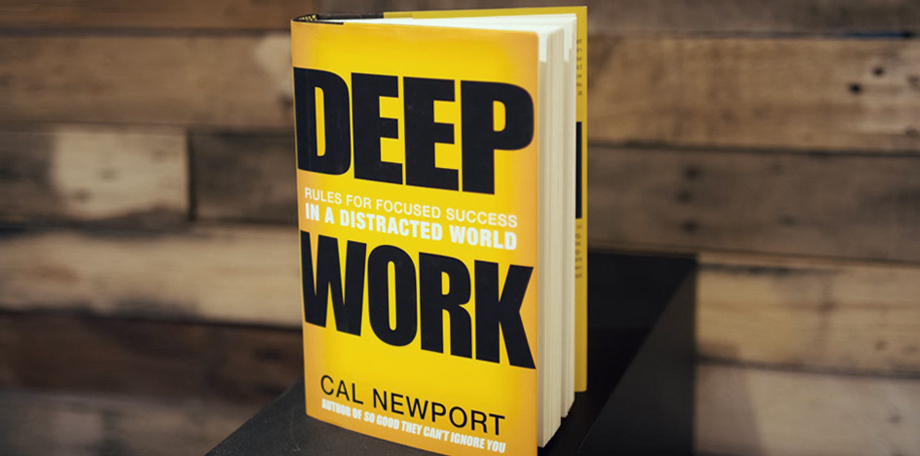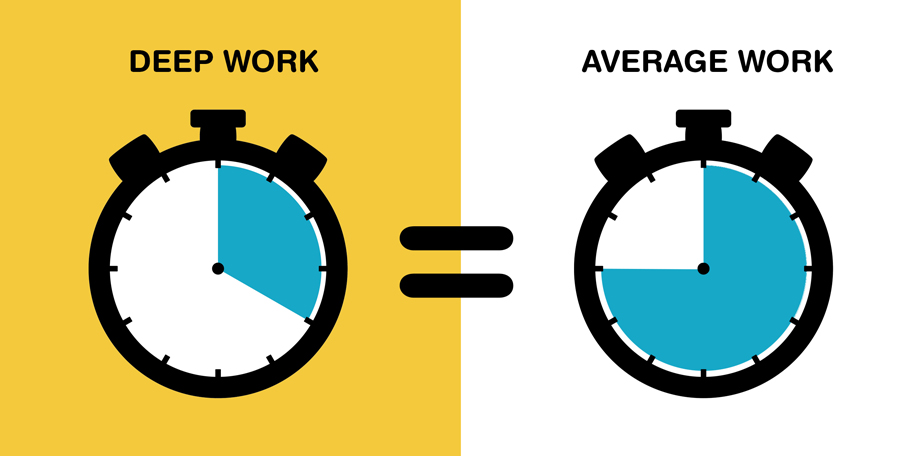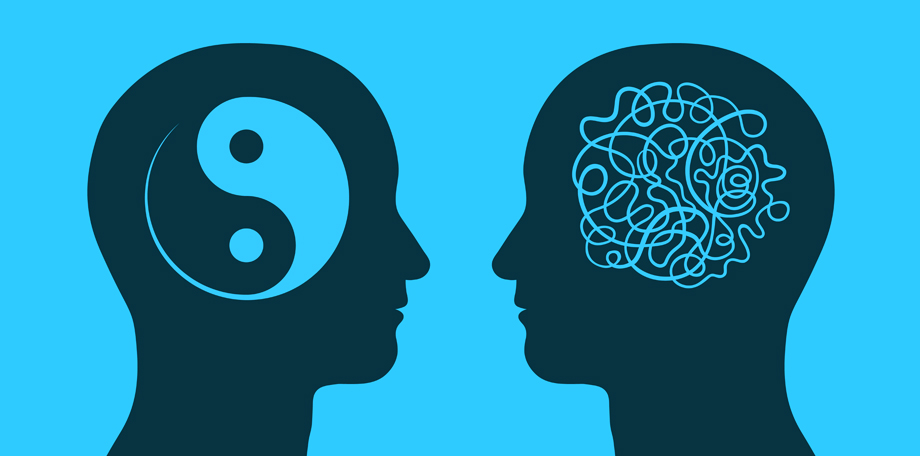We generally approach prioritizing our tasks in an elementary way: what’s the most important thing for me to get done today? Even if you happen to have more extravagant frameworks for prioritization, they are usually superficial or topical. What’s missing from these strategies is how you can effectively schedule your time to use your brain most effectively.

The Menace of Multitasking
Most people feel that they are masterful at multitasking, but the neuroscience will tell you that is a fallacy. Nobody is good at multitasking. What’s happening when we multitask is that our brain is able to do context switching back and forth and rather quickly. But it’s actually one of the most inefficient ways to use your brain simply because it’s a misnomer. You can’t do more than one task, one process at a time.
Instead, every time you move from one subject to another and back again, you are using up resources and fatiguing the brain, especially if the thoughts aren’t related. I especially see this in my “doer” executive coaching clients. They feel good about the quantity of the tasks they are getting done rather than the quality or the importance of what they are getting done. But most importantly, this “multitasking” is constantly draining cognitive resources and energy.
Deep Work Works
It’s simply not possible to use our brain all day long at the same level of engagement. That’s why prioritization is so important, because you need to reserve time for the most important things. These are usually the tasks or projects we tend to push off and don’t want to deal with because they require larger blocks of time, they’re complex, and we haven’t scheduled that kind of processing time.

A while back, I read a book called Deep Work by Cal Newport which outlines a strategy for engaging your brain in what he calls “deep work.” He suggests setting aside big chunks of time in your day in which you are completely undisturbed. That’s pretty hard to imagine in today’s uber-connected world!
Related: The Brain Burden of Constant Tech
That means no texts, no emails, no TV, no radio, no podcasts, no distractions, no interruptions – truly nothing is in front of you except the work at hand. Deep work requires complete focus, but it is where we push ourselves to our intellectual and creative limits. After engaging in deep work, you feel satisfied and proud. But it’s incredibly hard to stay in that state for more than a few hours a day.
I attended a workshop recently that shared a stat that four hours of deep work is equivalent to 8-10 hours of your average workday’s production. That means that when you buckle down for four hours without any distractions, you are able to focus on the task at hand and be far more productive.

Power your Prefrontal Cortex
The part of the brain that we engage for deep work is called the prefrontal cortex. For a leader, that part of the brain is what a body is to an athlete. It needs strengthening, conditioning and exercise, and it allows for effective reasoning, the ability to make decisions, and understand what to focus on and how to focus on it.
Strengthening your prefrontal cortex will allow you the capacity to focus for longer periods of time and tune out distractions for optimal performance.
Writers Do It Best
The workshop also revealed the results of a study that showed which professions found their work most meaningful. Writers spend almost all of their time immersed in a deep work space while they are writing. Newport also reports that writers produce the highest quality of work.
Over the years, I’ve coached several writers who have come to me with writer’s block. They are authors with a book deadline looming but haven’t been able to write for six months or longer. I coach them all in the same way and every single one of them was able to break out of that block.
- When you get up in the morning, do everything you need to do to prepare yourself for the day. Shower, make coffee, eat breakfast, exercise – do it all before you commit to deep work.
- Clean up your desk so that you aren’t looking at any bills that need to be paid or to do lists that could distract you. Start with a clean, blank slate.
- Have a big glass of water ready so that you will not need to get up and refill it. Have a snack if needed, because once you sit down, there will be no more food (i.e. distraction).
- When you are ready to start the four-hour writing session, there are to be no distractions so put your phone in another room and turn off email notifications on your computer. All you should have in front of you is a blank page on your laptop.
- Start writing, or don’t. If you continue being blocked, sit there and do literally nothing. You can daydream, meditate or write. Your choice.
This method has been wildly successful for all of my writer clients, and I have never had the need to work with a writer for more than a few weeks. That’s because they start writing prolifically! They can’t tolerate the situation or boredom, and because there are no other ways to use their time, they push past the writer’s block simply with dedicated focus.
Schedule Your Day for You
Not everyone is the same when it comes to the time of day that’s best for focus. For most of us, our brains are most effective in the morning, but that’s not the case for everyone. In the morning, we are rested and refreshed. You have new capacity for the day so most people will schedule their deep work time in the morning. During that timeframe, they can work on complicated items such as business strategy or other items that take a lot of brain power. During your deep work time, use that time for thinking, processing, writing, and strategy, anything that requires a lot of thought processes.
Sometimes you need to slow down in order to speed up, so take the time to prepare your day and week ahead of time by blocking out time for both deep work and regular tasks. As a leader, take a close look at that task list. Is there anything you can delegate? Is there anything you can outsource? Can you add more automation to your life? There are numerous apps available to help manage tasks. Doing these tasks in your bucket of time that is dedicated to tasks and grouping those tasks accordingly is extremely effective for being productive.
Thoughtfully planning your errands so that they can be done in one trip can be very efficient. Make a list of everything that needs to get done and the order you should attack the list based on the location of the errands. There should never be a need for multiple trips, as that’s just a time suck!
Give Yourself Time to Think
There will be some items on your “to do” list that you can’t actually get started working on yet because you have to make some decisions first. It’s a step before the task can actually be done.
For example, your neighbor is complaining about your tree that is encroaching on his property, and he’s very upset. This isn’t your highest priority because you don’t really know what to do about it right now. You may need to consult your insurance company, an attorney or research precedence for this situation in your neighborhood. Before you can address the issue with your neighbor, you need to spend some time learning more about the confusing situation so that you can come up with a solution agreeable to both sides and present it.
Scheduling time to do the research and making decisions on the front end will help you move forward and complete tasks faster. This is far preferable than carrying this “weight” around.
Limit Visual Awareness
Our brains keep thinking about what is not done until it gets done. It doesn’t go away even if you try to stop thinking about it.
Let’s say you just had your house painted professionally, and your child has scuffed the wall just two days after the job is done. You call the painter, but he’s on another job for two weeks and can’t get to you until then. Every time you walk into the room and you see that scuff mark, it drives you crazy. Eventually, it gets softer. After even more time, you don’t consciously think about it. It’s no longer a high priority, but every time you walk into that room, while it’s no longer conscious, your subconscious mind still registers it, and it’s still draining cognitive resources.
That’s why when we go on vacation, we feel so invigorated and free. Your brain isn’t inundated with what it sees unconsciously and the visual cues are no longer draining you.
The phone is also another cue to your brain both on an unconscious/subconscious level, because when you see the phone, you automatically think about checking messages and emails. So, I suggest putting the phone completely out of sight and on silent for periods of time during the day.
Another suggestion I make to my coaching clients is to have a list of everything that you need to do in your phone or in an app. That’s far more effective than having lists or post it notes everywhere that are constant reminders of everything that must get done.
Emotions are a Big Brain Drain
Just like the phone is a constant reminder for you, any emotions you aren’t dealing with also can be draining for your brain. If you are avoiding going into a meeting because you feel as if you aren’t properly prepared, that is emotionally draining. When your amygdala (the part of the brain that feeds our fight or fight response) is triggered, when something is bothering us or is unresolved, it will impact the quality of our capacity to focus.
This is how procrastination works. Even though we try to avoid or push something away, you still carry it around with you. You still feel the weight of it on your shoulders so it saps your productivity.

Busyness is Not Productivity
At the opposite end of procrastination is those people who are driven by a sense of urgency; they are doers. It’s really important to stop, slow down and help understand what buckets your tasks should be grouped in. For this, I always turn to the time management matrix presented in 7 Habits of Highly Effective People by Stephen R. Covey in which tasks are divided into four quadrants:
- Important – Urgent (aka necessity)
- Important – Not Urgent (aka effectiveness)
- Not Important – Urgent (aka distraction)
- Not Important – Not Urgent (aka waste)
Covey believed the key to being effective lies in quadrant two. By focusing your attention and spending time on these important yet not urgent matters, you reduce distractions in quadrant three and can “just say no” to everything in quadrant four. Many of us spend more time in quadrant three than necessary because we misinterpret urgent matters for important issues. By applying this theory to our tasks, we can determine whether something is a good use of our time or whether we can let it go.
Busyness is not the same as productivity. Even though we may be tempted to tackle all of our tasks so we see a list of strikethroughs, you must build your schedule for maximized productivity, and that includes allowing time for deep work. People may say they are too busy, but they are often majoring in minor things.
Allow your Brain to Rest
The other piece in prioritization that is underrated is the time we need to allow our brains to rest. We simply don’t let it to happen often enough, because they are constantly stimulated. We listen to the news while we shower, we brush our teeth while watching TV, we go for a walk while listening to a podcast, we go to bed with Netflix. Rarely in our day do we have quiet time for our brains.
But giving our brains that quiet time brings forth creativity. How many times have you had a problem to solve and you’ve gone for a run and the answer has come to you out of the blue? Solutions often arise when we aren’t even thinking about the problem.
If you have to schedule this into your day, please do. It could simply be spending 15 minutes outside in the morning while you enjoy your coffee. Don’t do anything but sit in your yard, listen to the birds, and breathe the air. Allow yourself the space you had when you were a child and you didn’t have a to-do list to encourage your creativity.
All of these suggestions, plus a strong meditation practice, help to strengthen that prefrontal cortex which will help you do the work you need to do more effectively. Be conscious of the different requirements that your brain needs to function optimally. How you schedule and use your time is critical to be able to work less and do more, which is what we all want to do in life.
